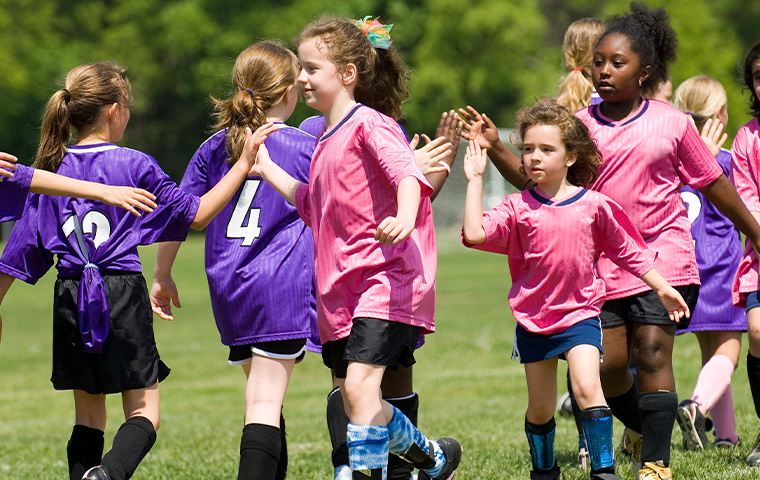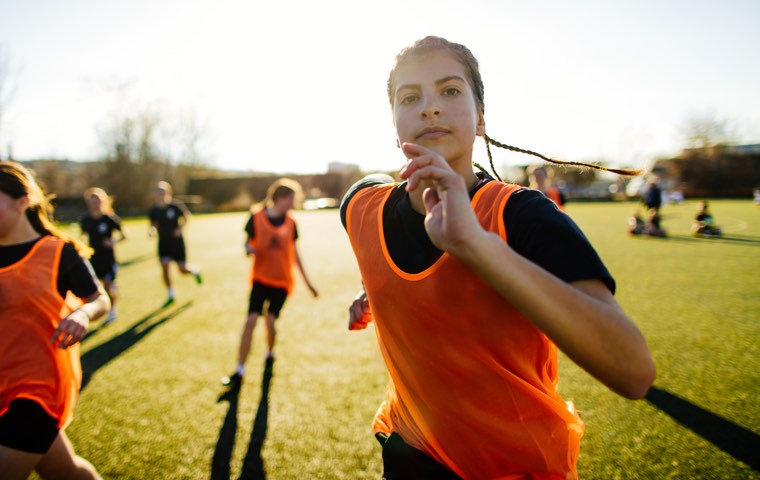Hooray for the First Day of School!
As summer winds down, families look forward to the first day of school with a mix of excitement and a little nervous energy. Kids of all ages (and parents, too) can have big feelings about the changes that come with starting a new school year. And that’s normal! Whether you’re dropping off that brand-new kindergartener or waving goodbye to your teenager as they drive away, it’s important to understand these emotions and help your kids prepare for the first day of school. By helping them understand what to expect, you can make things easier on everyone and reduce some of the jitters.
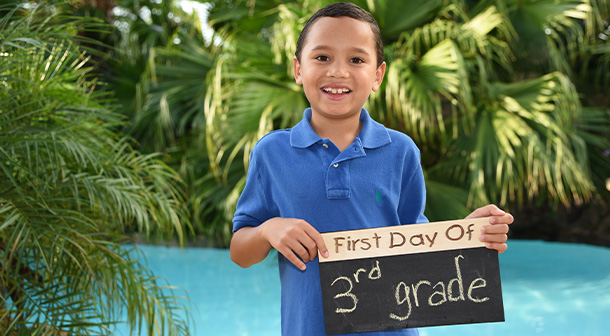
Start Early: Getting Ready for the First Day of School
Preparing for that first day can help you and your child feel more relaxed and confident that things are under control. Below is a list of things to help get you ready:
-
Make Sure Vaccinations Are Up to Date
Before the first day, check with your school district and your child’s doctor to make sure he (or she) has all required vaccinations to start the school year. In Texas, school and child-care immunization requirements are determined by the state law and policies. Keeping kids immunizations up to date is a critical part of preventing the spread of disease and protecting the health of your child.
-
Shop Together for School Supplies
When there’s so much to do, it’s easy for kids to feel overwhelmed and out of control. Giving a little control back to your child can help him feel excited and prepared for the first day of school. Your child’s school should provide a list of school supplies needed for each grade. Let your child choose notebooks, pencils, folders, and other items in their favorite colors, or with animals or characters that they like, as a fun way to express their personality. But, check with your school before you buy to find out if there are limitations on what they kids can bring to school
-
Let Your Child Pick Out School Gear
Who doesn’t love a special first day of school outfit? Maybe your child will want to wear a familiar t-shirt with his favorite character, his most comfortable shorts, or lucky shoes. Other families like to go shopping for new clothes before the first day of school. Prepping the gear your child will need for the year, such as a backpack and lunch kit, can help him feel like he’s ready on that first day. This is especially important if you have a kindergartener or a child who has never been to school before.
-
Visit Your New Campus
Tour your new school ahead of time so your child can learn the layout of the campus and know where he’s going on the first day. Check with your school—many elementary schools have a Kindergarten Roundup in the spring for incoming kindergarteners, and many have a Meet the Teacher event for all students a few days before the first day of school. If possible, practice walking to your child’s classroom and to other places around campus that he will visit such as the lunchroom, library, restroom, gym, and music room. Visit the playground and try out the swings and monkey bars before the first day!
-
Send a Love Note
On the first day of school, include a note in your child’s lunchbox or backpack. It doesn’t need to be long—just provide a few words encouraging him to have a good day and reminding him that you love him. If your child can’t read yet, draw a picture or even just a heart!
-
Read About the First Day of School
Reading about others’ experiences can be a good way for your child to know what to expect. It’s also a great way to find out that everyone is a little nervous on the first day of school. Check out library books about starting kindergarten and the first day in a new class. Ask your librarian for book recommendations that your child might like. Some of our favorites are The Pigeon Has to Go to School by Mo Willems, Curious George’s First Day of School by Margret and H.A. Rey, Little Critter: First Day of School by Mercer Meyer, First Day Jitters by Julie Dannenburg, On the First Day of Kindergarten by Tish Rabe, and Kindergarten, Here I Come by D.J. Steinberg.
-
Do a Practice Run
If your child is really anxious about the first day of school, try doing a dress rehearsal or trial run. Set an alarm for the time that you’ll set it on school mornings. Eat breakfast, get dressed, and practice the drive to school. If your child will be riding a school bus for the first time, learn the bus number and practice walking to and from the bus stop. If possible, arrange for an older sibling, neighbor, or friend to walk with your child each day. Many kids feel more comfortable when they have a friend or sibling to go with them. All these things can help new students, especially kindergarteners, feel better prepared and put them at ease.

Many schools have online platforms that let parents see their child’s grades and send messages to teachers, staff, and other classroom parents. Be sure to find out what is available at your school.
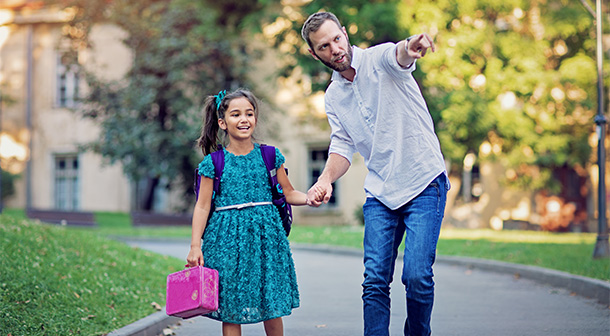
Setting Your School Day Routines
No matter how old your child is, having consistent daily routines will help everyone succeed during the school year. Knowing what to expect can also help everyone feel calmer on the first day of school and beyond. Start early! Setting up these routines for a week before the official start date is a great way to get your whole family ready!
Morning Routines
Think about how much time you and your child will need in the morning. Start with what time you must be at your job or school, and work backward to make a plan that so you won’t feel rushed or be late. How long will it take to get to school? How much time does your child need to get dressed and eat breakfast? What time should you set your alarm? Don’t forget to leave yourself a few extra minutes in case something unexpected comes up.
Bedtime Routines
Once you know what time you need to wake up, make a plan for bedtime. Most elementary age children need to go to bed around 7:30 or 8 p.m. to be well rested. Doctors recommend that school-age children get 9 to 12 hours of sleep each night. Create a consistent, calming bedtime routine that happens at the same time every night. Your child’s routine might include taking a bath or shower, brushing teeth, reading books together, or singing a special song. Make sure the place your child sleeps is quiet and dark, with no electronic devices such as TVs, tablets, phones, or computers. If your child has trouble settling down in the evening, getting some exercise during the day can help him sleep better at night.
Reading Time
Whether you have a kindergartener or an older child, make sure make time to snuggle up and read books together. Many families read together before bedtime, but depending on your schedule, you might read together in the mornings or when your child gets home from school. It doesn’t matter when you do it, just that you do!
Studies have shown that reading to your child each day helps with brain development and improves school performance. Children who are read to do better on standardized tests, and reading can have huge positive effects on kids’ behavior and attention. Reading together can also be good one-on-one time—you can talk about your child’s day and how he’s feeling.

Consistency Matters
Children thrive when they know what to expect, and having regular routines gives them a sense of security and safety. When creating a routine, talk with your child about what will happen next in his day. Some families find it helps to make daily or weekly calendars that they keep in the kitchen or hallway. While there will certainly be days when things don’t go according to plan, setting up reliable routines is a good place to start.
Communication is Key
It’s exciting to hear your child talk about his first day of school. Make sure your conversations with him—and his teachers—continue throughout the school year, and not just the first few days of school. Having open communication throughout the year will help your child have a successful year.
Ask Open-Ended Questions
Some kids like to talk and share more than others. Setting the groundwork early can encourage your child to talk to you about school, his friends, and his activities. Instead of asking yes or no questions, ask your child about his day and what he’s learning, such as:
- What was your favorite part of today?
- What is the best part of being a kindergartener?
- Tell me something funny you saw today!
- What did you talk about in science class today?
- Who is the funniest person in your class?
Need parenting help now?
The Texas Parent Helpline is available 24/7.
- Call 833-680-0611
- Chat with us
- Text 833-680-0611
Help with Projects and Homework
When your child has homework or a project, let them know early on that you’re there to support them. This can mean helping review the assignment or project, gathering supplies, and asking questions to help him stay on track. Don’t go overboard though – remember it’s their homework and not yours!
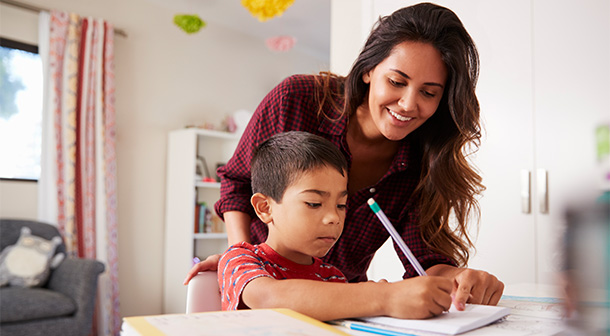
Help Kids Manage Their Time
Some kids do their assignments on their own, while others might need help staying focused. Learning how to work efficiently—and to “check your work”—are skills that take time. Starting when your child is in kindergarten, help him manage his time by having him think about a plan. Make a list of assignments or tasks and estimate how long each one will take. Help him set priorities and tackle the most important assignments first.
Working with Teachers
Having family members actively involved in school can help kids feel more confident. Studies have shown that family participation in school events helps children learn and increases their enjoyment at school. Start off early in the year and build a relationship with your child’s teacher. Here are some tips:
Keep Teachers Updated
If something is going on either at school or at home, let your child’s teacher know. This includes both positive news (a new sibling, a family trip, a move) and negative news (a divorce or separation, a death in the family, the loss of a pet). When there are changes in your child’s life, he is likely to act differently at school. Whether you send an email or set up an in-person meeting, sharing information gives your child’s teacher the full picture so she (or he) can support your child in the best possible ways.
Check in Every Few Weeks
Don’t be shy about asking how your child is doing. This can be a quick email with your phone number should the teacher need to follow up.
Attend Parent/Teacher Conferences
Many schools have parent/teacher conferences several times a year, often at the end of each semester. This is chance for you to talk to your child’s teacher one-on-one and hear how things are going in the classroom.
Stay Up to Date
Make sure you’re signed up to receive emails from the school and your child’s teacher. You can also regularly check the school and teacher websites to see what’s going on and what events and projects are coming up.
Go to the Classroom
No one can go to everything, but it means a lot to kids when their parents visit their class. Try to attend school and classroom events and field trips when you can. It’s also a great chance to get to know the teacher and other parents, and a good time to witness classroom dynamics for yourself.
Say Thanks
Kind words are a simple way to make someone’s day. Send an occasional thank you note or email letting your child’s teacher know you appreciate what she is doing for your child.
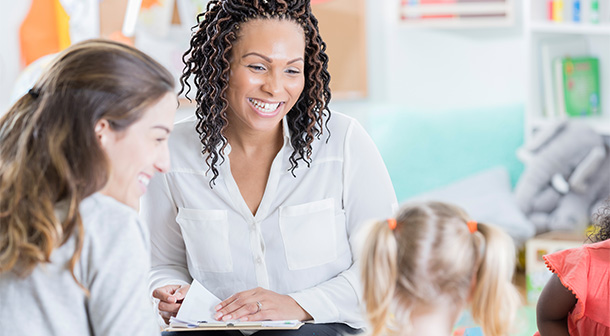
Finding School Success
The road from kindergartener to high schooler is a long one, and it’s important to take things day by day and week by week. When things get overwhelming (and sometimes they will!), go back to the basics and focus on your routines. By supporting your child from the first day of school and beyond, you’re setting a strong example and laying the groundwork for long-term success in school and in life.


